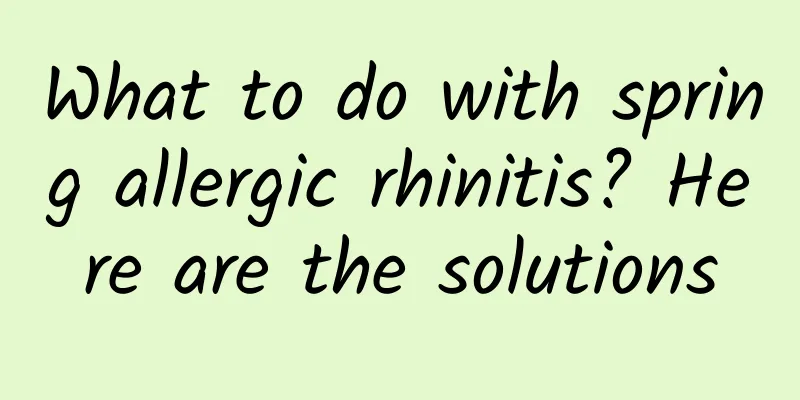What to do with spring allergic rhinitis? Here are the solutions

|
Spring is here People go out to enjoy the flowers Enjoy the sunshine However, for some people The warmth of this spring day is accompanied by the trouble of allergic rhinitis Make them suffer What is allergic rhinitis? Why is spring the peak season? How to effectively relieve allergy symptoms? This article will answer your questions one by one Collect now Let’s protect our health and enjoy the beautiful spring together What is allergic rhinitis? Allergic rhinitis is a common non-infectious inflammatory disease of the upper respiratory tract, affecting approximately 500 million to 1 billion people worldwide, and the prevalence rate among adults in China is approximately 17.6%. Causes Allergic rhinitis is a multifactorial disease caused by the combined effects of genetic and environmental factors. Environmental allergens include seasonal allergens and perennial allergens.
Typical symptoms The typical clinical manifestations of allergic rhinitis include nasal itching, nasal congestion, paroxysmal sneezing, and clear nasal discharge. It may also be accompanied by eye symptoms such as itchy eyes and tearing, and lower respiratory tract symptoms such as persistent cough and wheezing. How to save yourself? Get rid of allergens in the environment During the pollen spreading season, you should reduce outdoor activities and wear masks, goggles, and nasal filters; if you are allergic to dust mites, keep the room dry and ventilated, and dry and wash clothes and bedding regularly; if you are suspected of being allergic to animals, you should avoid contact with animals.
Including antihistamines, local or systemic glucocorticoids, decongestants, anticholinergics, leukotriene receptor antagonists, anti-IgE monoclonal antibodies, etc. As a patient, you must not take medication at will, and you need to be selected by a professional doctor! Specific immunotherapy That is, desensitization therapy, by allowing patients to repeatedly contact allergen extracts, gradually improve the patient's tolerance to allergens, thereby alleviating allergic symptoms. Nasal saline rinse As an auxiliary treatment option, it can increase the effect of other treatments, has good efficacy, and is simple and inexpensive. Source: Beijing Health, Civilized Beijing |
<<: Interesting Talk About Medicine | Fentanyl Transdermal Patch (with Audio)
Recommend
[Medical Q&A] Is depression really a "mental cold"? Can it be completely cured?
Planner: Chinese Medical Association Reviewer: Wa...
Irregular menstruation and abdominal pain
It is normal for many women with cold uterus to e...
Do you know? Open the door | Are the vegetables you pickle yourself safer? Click here to learn how to eat pickled vegetables safely
Written by: Li Caihong, Urumqi First People's...
What is the disease of female urethral granulation?
What kind of disease is female urethral granulati...
How long does it take for hair dye to enter breast milk?
Ten months of pregnancy is a very tiring process....
What does polycystic ovary ultrasound show
In daily life, almost every patient with PCOS use...
Girls drink black tea or green tea
Black tea and green tea are two of the most commo...
Is low-grade cervical squamous intraepithelial lesion serious?
Cervical puncture biopsy can timely treat the cha...
Breast cancer staging criteria
Nowadays, women are very concerned about informat...
What to do if the uterine artery is high
Many pregnant women will have a physical examinat...
Can I drink tea during menstruation?
As we all know, women's menstrual period is a...
What are the symptoms of placental abscess?
For most women, placental detachment is a very se...
What are the symptoms of endometriosis in women?
Some women may have endometriosis in their daily ...
Beware! Don't take this common medicine carelessly! Improper use may harm your body, tell your family immediately
Sore throat, runny nose Cold, fever, headache Man...









